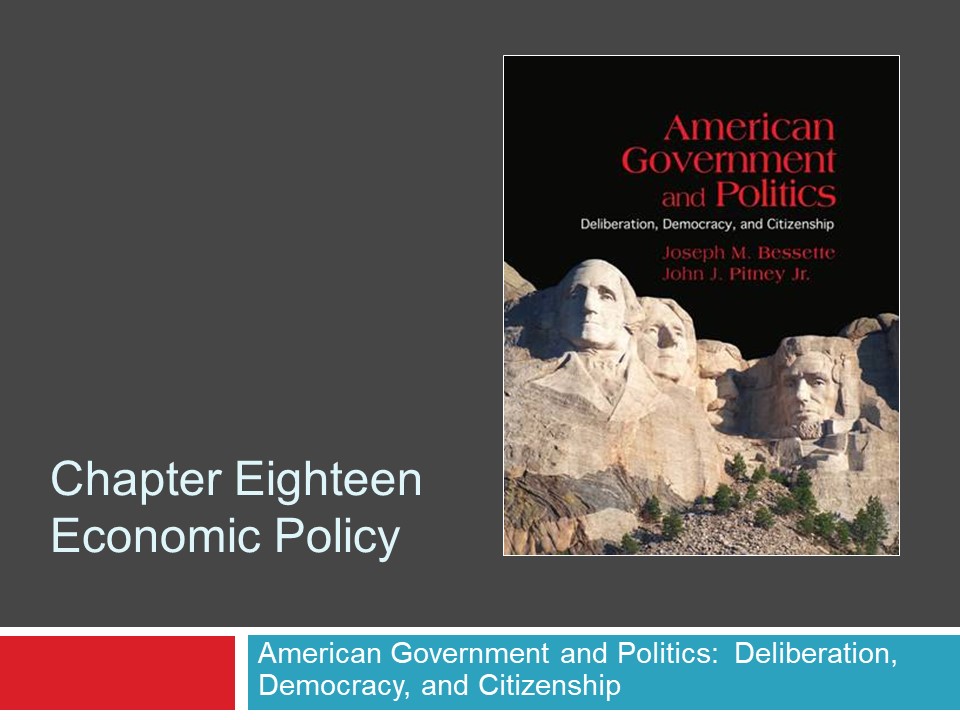Chapter Eighteen Economic Policy PowerPoint PPT Presentation
1 / 30
Title: Chapter Eighteen Economic Policy
1
Chapter EighteenEconomic Policy
- American Government and Politics Deliberation,
Democracy, and Citizenship
2
Chapter Eighteen Learning Objectives
- Sketch the history of economic policy and its
relationship to citizenship - Describe the elements of fiscal policy
- Explain why the tax system is so complex
3
Chapter Eighteen Learning Objectives
- Analyze the mechanics of monetary policy
- Summarize the elements of regulatory policy,
especially in matters of finance - Understand the politics of trade policy
4
Chapter Eighteen Learning Objectives
- Discuss how policymakers and citizens deliberate
on economic policy
MARK RALSTON/AFP/Getty Images
5
Introduction
- Most agree on certain economic goals
- Economic growth (change in GDP)
- Low unemployment
- Low inflation (general rise in prices)
6
Introduction
- Economic policy includes
- Fiscal policy
- Monetary policy
- Regulatory and trade policy
7
A Brief History of Economic Policy
- Founding an economy
- Laissez-faire approach
- Government fostered economic growth through
communication and transportation - Creation of Banks of the United States
8
A Brief History of Economic Policy
- Civil War and Progressivism
- Economic policy caused rift between North and
South - Laws passed to create uniform national currency
- Progressive movement influenced economic policy
9
A Brief History of Economic Policy
- World Wars and their aftermaths
- Government finances difficult to track
- New Deal programs created annual deficit
- Tax withholding authorized in 1943
10
A Brief History of Economic Policy
- An age of uncertainty
- 1970s saw high inflation, economic stagnation,
and unemployment - Supply-side economics became more prevalent
economic theory and Ronald Reagan was a strong
supporter of this idea
11
Fiscal Policy Taxes
- What are the costs and benefits of the federal
governments complex system of income taxes?
National archives
12
Fiscal Policy Taxes
- Types of taxes
- Individual income taxes
- Corporate payroll taxes
- Payroll taxes
- Excise and sales taxes
Harley Schwadron/Reprinted by permission of
www.CartoonStock.com
13
Myths and Misinformation
- Income tax tales
- A quick search of the Internet will reveal many
myths about how much citizens owe on their taxes.
- The IRS warns against using such misinformation.
14
Fiscal Policy Spending and the Budget
- How do the executive and legislative branches
deliberate about fiscal policy? - Two considerations
- Economic impact of fiscal policy
- Must consider the components of the budget
15
Fiscal Policy Spending and the BudgetThe
Budget Process
16
Pledges and Promises
- Full faith and credit of the United States
- The full faith and credit of the federal
government backs the payments on public debt. - What would happen if the government failed to pay
its debts?
17
Fiscal Policy Limits of Fiscal Policy
- Limits of fiscal policy include
- Proposals take months to become law, so there may
be a policy lag - Much of federal spending is outside the
appropriations process - Uncertainty about future economic conditions
18
Fiscal Policy Deficits, Surpluses, and the Debt
- Why do deficits happen?
- Deficits may grow because policy goals often
override fiscal goals. - A president may be insistent on a policy without
regard to the long-term economic impact of that
policy.
19
Monetary Policy Organization and Policy
- It is the responsibility of the Federal Reserve
Board (the Fed) to assist in managing the supply
of money and credit. - The goal of the Federal Reserve Board is economic
stability.
20
Monetary PolicyOrganization and Policy
- The Fed does not directly dictate interest rates,
rather it has power over the federal funds rate. - The Fed does not have unlimited power as it is
limited by global economic conditions and federal
government deficits.
21
Monetary PolicyOrganization and Policy
Source The Federal Reserve System,
www.federalreserveeducation.org/FED1015FHTML/ str
ucture/, accessed May 7, 2009.
22
Monetary Policy Deliberation and the Fed
- A member of the Federal Open Market Committee
explained that his research is not only based on
hard data, but also personal accounts and
anecdotal evidence. - How does that approach contribute to
deliberation?
23
Regulatory and Trade Policy
- What is the appropriate role for the government
in policing economic activity? - Do international trade agreements infringe on
American sovereignty?
24
Regulatory and Trade PolicyRegulating the
Marketplace
- Four goals of financial regulation
- Protect consumers from fraud, deception, or
unfair practices - Ensure the integrity and fairness of markets to
prevent fraud and manipulation
25
Regulatory and Trade PolicyRegulating the
Marketplace
- Four goals of financial regulation
- Monitor the safety and soundness of institutions
- Ensure the stability of the overall financial
system
26
Regulatory and Trade PolicyTrade
- International trade is a source of conflict.
- Those that profit from exports typically support
free trade and those who are concerned about
foreign competition typically support
protectionism.
27
International Perspectives
- Economic and political freedom
- According to the data presented, does there
appear to be a relationship between economic and
political freedom? - Where does the United States rank?
28
Economic Debate and Deliberative Democracy
- Deliberation depends on knowledge of basic
information and shared goals but, when it comes
to economic policy, Americans often disagree
about how to achieve goals. - Disagreements underlie deliberations about
economic policy.
29
Deliberation, Citizenship, and You
- Catching waste and abuse
- The federal government is encouraging citizens to
report waste and abuse with government money
through the Internet, toll-free phone hotlines
and fax.
30
Summary
- Federal budget large part of economy, but private
sector is larger - United States part of global economy
- No one government economic policy
- Many ways to appraise economic policy

